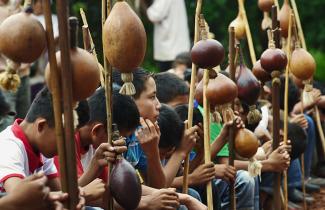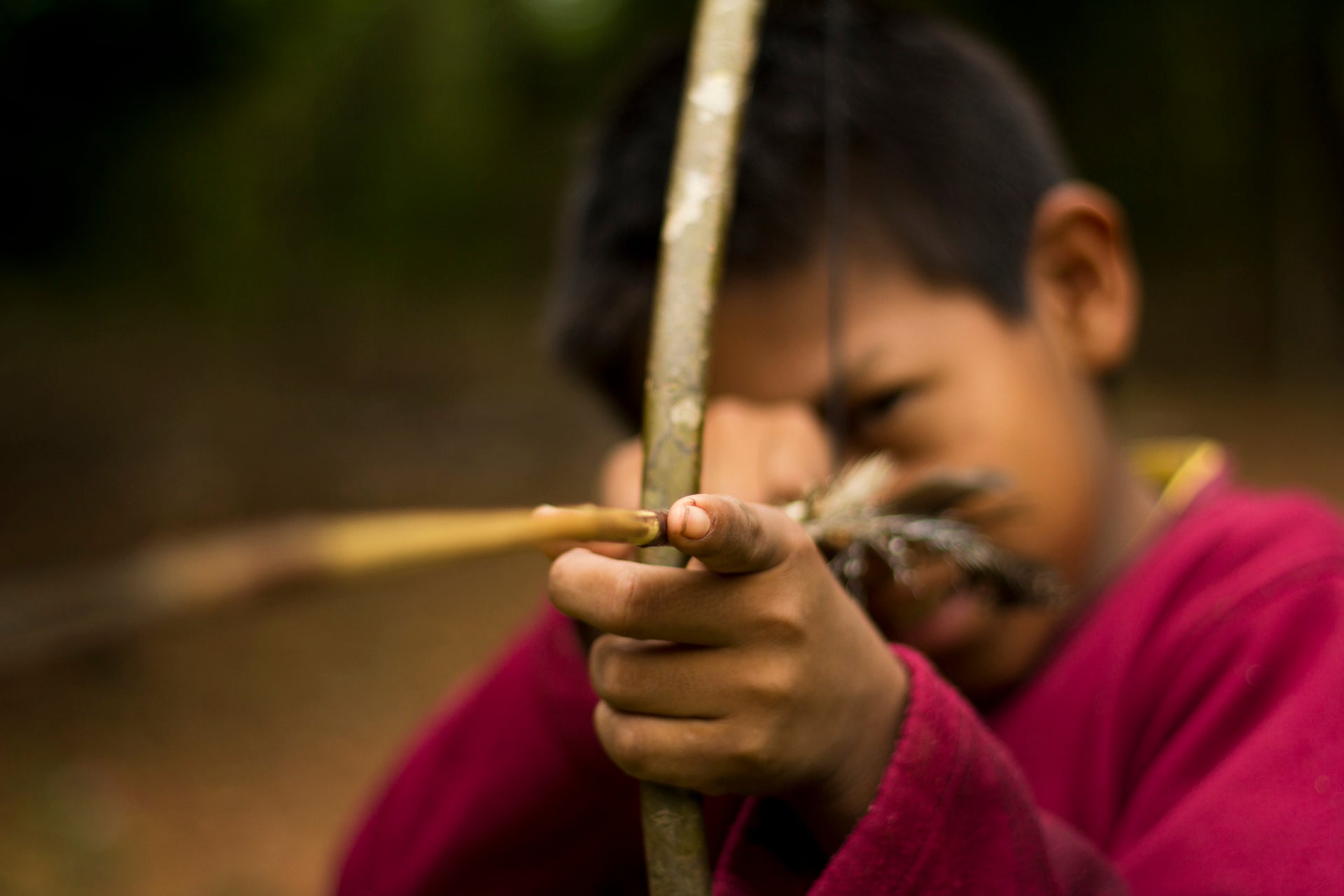
In October 2022, Cultural Survival published an article denouncing the murders of Guarani Paĩ Tavyterã leaders Alcides Morilla Romero and Rodrigo Gómez González following a confrontation between the security forces of the Paraguayan State and the People’s Army of Paraguay (EPP). Several other members of the community were injured, including Leonardo Gómez Riquelme, who was hospitalized.
To fully understand the seriousness of the situation, it is necessary to look at how the Guarani Paĩ Tavyterã Peoples have been in the middle of a confrontation where their rights have been systematically violated by the army, the EPP, and other illegal actors. Though parts of their territory have been militarized, the Paĩ Tavyterã Peoples maintain their resistance through care, respect, and dialogue. The members of the community we spoke to clarified that they do not use violence, and described themselves as a peaceful People.
The militarization of northern Paraguay began about 10 years ago, but it was only 3 years ago, in 2020, that it reached the territory of the Paĩ Tavyterã. Located in the northwest of Paraguay near the border with Brazil, their territory encompasses the Paraná River Atlantic Forest, a 7,000- hectare stretch of tall forest and the source of many important resources. Areas like this that are rich in natural resources have been the most recent targets of militarization.
Before the conflict, the community used the forest only to harvest medicinal plants. After the Paraguayan Indigenous Institute purchased the land for the Paĩ Tavyterã, and thanks to the expropriation law that secured the Paĩ Tavyterãs’ legitimacy of ownership, the community carried out a demarcation of the area, installing gates and boundaries to separate it from neighboring territories and fighting the increasing number of forest fires that have resulted from climate change.
Jasuka Venda is considered by the Paĩ Tavyterã Peoples their place of origin, “the most important and most immense place.” Guardians and guardian families live here, protecting the place that belongs to all the communities that make up this territory. The area has always been difficult to access due to its remoteness, and even today, people from the community mainly arrive on foot or by motorcycle.

A Guarani boy with an hu'y (arrow) in Paraguay. Photo by FrankOWeaver
Recently, a Paĩ Tavyterã community near Jasuka Venda in the village of Tekoha Guasu Yvy Pyte was attacked for the second time since last October. Armed men in four trucks entered the community, ordering the people to relocate under the guise of falsified titles and property documents. The community could not take photos or videos of the attackers due to the risk of exposure. Now, nearly one year after the murders of Romero and González, the community continues to receive anonymous threatening phone calls warning them to vacate their lands.
The Public Ministry (prosecutor’s office) so far has failed to address the invasions that seek to dispossess the community of their lands, and the families and community of Romero and González continue to wait for justice.The press reported that their murders were committed by the EPP; however, it is unclear whether this is the truth. Meanwhile, the house where Romero and González were murdered was burned “accidentally and mysteriously.” The guardian families who lived nearby abandoned their homes and belongings, and since then, travel to Jasuka Venda has become even more complicated and dangerous.
Jasuka Venda is significant to the Paĩ Tavyterã Peoples not only because of its resources, but also because it has been considered a sacred site since ancient times. In a bitter irony, it has become a place where environmental crises and social conflicts are unfolding. In addition to the invasions, there are some outside the community who want to enter Jasuka Venda to plant marijuana. Livestock introduced by ranchers is yet another threat to the biodiversity of the area. The EPP justifies the continued presence of the Internal Defense Operations Command of the Joint Task Force, an armed military group, but there are no influential people in the area to kidnap; there are no ranchers living nearby, only the workers.
All of these events are unfathomable to the Indigenous communities, who are innocent bystanders—and, all too frequently, collateral damage—in the conflict between the EPP and the Paraguayan army. This conflict has disrupted the Paĩ Tavyterã peoples’ ability to travel as frequently and as freely to Jasuka Venda as they used to, and, consequently, to take care of the sacred site and keep the community safe; they regret that they were unable to warn the guardians of the area about the confrontation that led to the death of Romero and González. Even in the face of danger, the Paĩ Tavyterã people are committed to protecting their territory and will not abandon it.
Despite the ongoing conflict the Paĩ Tavyterã will continue to protect their lands, because in Paraguay, the protection and defense of territory are fundamental for Indigenous Peoples. The Paĩ Tavyterã people are calling to other communities and organizations for solidarity in continuing to make this conflict visible and for logistical support so they can continue defending their territory. The community is organized at the local level, but they haven’t been able to gain a national audience. They have held two meetings with the Paraguayan Indigenous Institute to find a solution to the problems they are facing, but no specific plan was reached, no roadmap drawn up. And so for now, they continue without a plan of action.
In the meantime, the community is working to make the value of their territory known. They have repaired a vehicle that transports caretakers to Jasuka Venda, but there is still much to do. Previously, leaders would roam the area as part of their protection system, but the conditions there now have made this difficult. Still, the community is determined not to abandon it. A community leader told us, “As Guarani Paĩ Tavyterã Peoples, we need to continue strengthening ourselves to strengthen our capacities to respond in the face of these adversities. We will not stand down. Even if it is difficult, we are resolute that we are the guardians of this place, and that we have guarded it for thousands of years. There has been life here since time immemorial. Despite the adversities, we will continue fighting.”
The Keepers of the Earth Fund is an Indigenous-led fund within Cultural Survival, which is designed to support Indigenous Peoples’ community advocacy and development projects. Since 2017, KOEF has funded 311 projects in 41 countries, through small grants totaling $1,607,859, as well as technical assistance, which have benefited 328 Indigenous Peoples in total. The KOEF awards grants of up to $10,000, which go directly to traditional Indigenous communities, collectives, organizations, and governments, to support their self-designed development projects based on Indigenous values. KOEF funds projects implemented by grassroots and emerging groups, with or without official registration from their State government, and is the first source of funding that some organizations and communities have ever received.
Top photo: Paĩ Tavyterã means "the inhabitants of the center of the Earth." Photo by Fotografías Nuevas.
